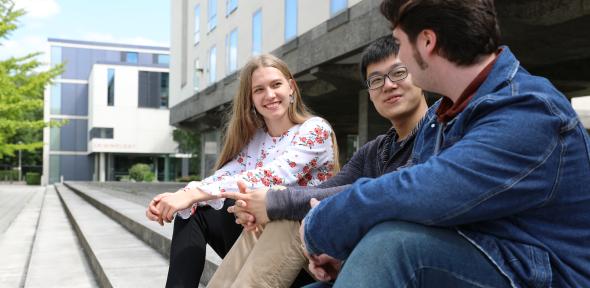
The University of Cambridge is one of the world's leading universities, providing a challenging, flexible and individual learning experience. Consistently rated among the top in national and international league tables, the University is globally respected for the quality of our teaching and research, and our students are greatly sought after by employers.
The University and Colleges
Cambridge is a ‘collegiate’ university. It’s made up of faculties and departments in different academic subjects and 31 Colleges (29 of these accept applications for undergraduate study).
Our students become part of their College community, giving them a sense of belonging that lasts long after they graduate. As well as being a member of the University and an academic faculty/department, students also belong to a smaller College community and this system offers a huge amount of individual pastoral and academic support for each student.
Below is a summary of the key functions of the University (through its faculties and departments) and the Colleges, to show how they fit together.
| The University | The Colleges |
|---|---|
|
|
The partnership between the University and the Colleges is one of our greatest strengths, it provides superb facilities, contact with the very best minds, and supervision and support to help develop your academic interests. We also pride ourselves on the close level of pastoral care provided by College tutors, support staff and student-run networks.
We've included some advice on choosing a College and profiles of each College in the Colleges section.
Our courses
We offer more than 65 subjects within over 30 undergraduate courses (take a look at the course outlines in the courses profiles and the subject A-Z for details). Most of our courses cover the subject area broadly to start with before allowing you to choose from a range of specialisms. This can offer you much greater flexibility than more narrowly focused courses elsewhere.
You're taught by experts in your field through a combination of lectures, practicals (where relevant), seminars, and regular group tuition known as 'supervision'. These allow you to explore course material in much greater depth, investigate new approaches, receive regular feedback and clarify anything you're unsure about.
Check your course page and Teaching and learning for more about our teaching and assessment methods.
Cambridge terminology
You might come across many new and unfamiliar words, terms and expressions when you are researching your university options. Some universities mention things that are particular to their institution, and Cambridge is no exception! Listed below are some of the terms you might come across on our websites with a quick guide to what they mean.
- Backs – the area of the city around the River Cam that runs along the backs of a number of central Colleges.
- Collegiate university – a university made up of faculties and departments in different academic subjects and Colleges.
- DoS – Director of Studies. All undergraduates have a DoS who's an expert in their subject and who is responsible for their academic welfare.
- Easter term – Each academic year consists of three eight-week terms (Michaelmas, Lent and Easter). Easter term runs from April to mid-June.
- Fellow – a senior member of a College, elected to a particular position of authority and responsibility in relation to the academic work and governance of the College.
- Formal (hall) – a College meal (normally three courses) with waiter service. Formal attire (and gown) is worn. The regularity and price varies by College.
- Lent term – Each academic year consists of three eight-week terms (Michaelmas, Lent and Easter). Lent term runs from January to early March.
- Long vacation – the three terms of the academic year (Michaelmas, Lent, and Easter) are separated by three vacations, Christmas, Easter and Long Vacation, during which undergraduate teaching is suspended.
- May Week – confusingly, this refers to the fortnight at the beginning of June after exams finish. Most end of year celebrations (including May Balls) are held at this time.
- Matriculation – this is the formal admission of a student to the University.
- Michaelmas term – Each academic year consists of three eight-week terms (Michaelmas, Lent and Easter). Michaelmas term runs from October to early December.
- Paper – an individual module, unit or topic on an undergraduate course; students usually take a number of papers each year (some are compulsory and some can be chosen from several options).
- Pools – if your College is impressed by your application but does not have a place for you, they may pool your application for other Colleges to consider. Find out more about our winter and summer pools.
- Porters – every College has a team of Porters to maintain the safety and security of staff and students; they’ll often be your first point of contact for information or help around College.
- Punt – a long, flat-bottomed boat that’s propelled by someone standing at the back and pushing a long pole into the river bed; punting along the Backs (see above) is a popular activity for students, locals and tourists alike.
- Senior Tutor – the College officer with overall responsibility for academic, welfare and disciplinary matters.
- Supervision – regular small group teaching sessions for undergraduates.
- Tripos – the formal term at Cambridge for an undergraduate degree course.
If you come across anything else that isn’t clear or you simply want to find out more about being a student at Cambridge, contact Student Admissions and Access.
